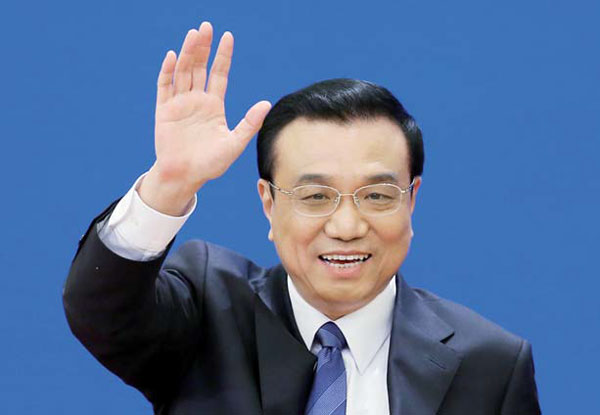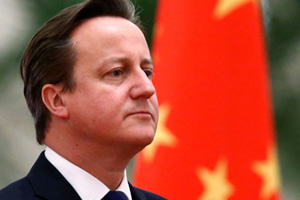Partners in peace

Premier Li's European VISIT is another step toward improving ties between TWO of the world's main actors
The fate of the world depends on the events that transpire in Eurasia, called a "grand chessboard", according to Polish-American geostrategist Zbigniew Brzezinski, writing in his 1998 namesake book. Europe, Russia, Central Asia and East Asia are the four critical players on the board.
Today, the relations among the big Eurasian powers are shifting to be more complicated, and more subtle, than ever, with many interwoven contradictions, frictions and cooperation.
In Europe, since the Ukraine crisis in February, tensions have escalated between Russia on one side and Ukraine, the United States and the European Union on the other.
The leaders of the world's leading industrialized nations held the G7 summit in early June in Brussels, and Russia was excluded for the first time in 17 years.
In Asia, territorial disputes between China and neighboring countries increased in the East and South China Seas. China has been critical of the US administration's "rebalance" or "pivot" to Asia. Also, China and Russia signed a $400 billion gas supply deal recently, securing a major source of cleaner fuel for the world's top energy user and opening up a new market for Moscow as it risks losing European customers over the Ukraine crisis.
Faced with numerous global challenges and a changing international situation, China-Europe political relations have reached a crucial moment and are undergoing a subtle shift. Can Europe become a key partner for China and vice versa?
Analysts from China and Europe say that as two important players, China and Europe increasingly need each other, and might draw on each other's strengths to explore more opportunities.
"China and Europe have comprehensive common interests and there is wide space for the development of bilateral relations," says Ding Chun, a professor of European studies at Shanghai-based Fudan University.
As Sino-Japan and Sino-US relations become tense, and leaders of the US and Japan approach Europe to seek consensus, China also needs support from third parties like Europe, Ding says.
Chinese Premier Li Keqiang is making his first official visit to the United Kingdom and will visit Greece on June 19, his third European trip since he took office in March 2013.
In March, President Xi Jinping visited the Netherlands, France and Germany, and became the first Chinese president to visit the European Union headquarters in Brussels.
These visits indicate the greater attention Chinese leaders are paying to Europe.
Diplomatic relations between China and Europe also are developing in the other direction. In late 2013, Dutch Prime Minister Mark Rutte started a trend of European leaders visiting China with his "fact-finding" mission after the November Third Plenum of the 18th Communist Party of China Central Committee unveiling the reform plan. Britain's Prime Minister David Cameron and France's then prime minister Jean-Marc Ayrault also visited China seeking co-operative opportunities.
During this year's Crimea crisis, "China has maintained a relatively objective and neutral stance, without affecting its relations with Europe," says Shi Yinhong, a professor of US studies at Renmin University of China in Beijing.
While the development of China-Russia relations had reached a high level both politically and economically, European leaders think that China-Europe relations are necessary to balance China-Russia relations, observers say.
"The driving force behind China-Europe relations is the fact that they are two vast economies that are absolutely linked with each other for growth," says Kerry Brown, professor of Chinese politics and director of the China Studies Centre at the University of Sydney. Brown leads the Europe China Research and Advice Network funded by the EU.
James Hardy, Asia-Pacific editor of IHS Jane's Defence Weekly, also points out: "The driving force is economic and that seems unlikely to change in the near future."
The EU is China's largest trading partner and China is the EU's second-largest trading partner.
"Apart from the economic ties, also culturally and historically the EU and China share many parallels, creating some sort of a bond between the two," says Peter Ho, professor at Delft University of Technology in the Netherlands.
The awareness of the similar historical trajectories of China and Europe is very important in creating mutual understanding between the EU and China, Ho says.
It might also be why, from a geopolitical standpoint, the EU has often taken a middle course. It could continue to have an increasingly important role in mediating, bridging and buffering relations between China and the US.
Yet, despite the numerous channels of bilateral cooperation between China and Europe, there is a gap in understanding and perception between the two.
Shi and Ding both point out that China and Europe are not always in tune because the two have some differences in ideology and trade disputes. "No side can expect too much from the other side," Shi says.
Brown at University of Sydney says,"In Europe, people understand the importance of China for economic cooperation but there is probably much less understanding of China's political system. There is a lot of misunderstanding about what this political system is, what it really means, why it is there."
Experts also say that China is changing rapidly and is renewing both its development model and role in global governance. Europe will have to cope with these changes and decisions taken now by Europe will have repercussions on how bilateral relations are framed and also on the global order, they say.
"It is very important to have people-to-people contact to get around such misunderstandings and learn where we are coming from In other words, mutual understanding will always be an issue. It might even become more complicated, but I think they will be forced to have an understanding of each other and how to deal with each other in the future," Brown says.
When it comes to intensified territorial disputes in the East and South China Seas, Hardy said, the US does not have an alliance with Vietnam, but its alliances with the Philippines and Japan will inevitably color its relations with China when such disputes occur.
US President Barack Obama's recent visit to Tokyo and Manila saw him emphasise the US commitment to these relationships. "This is vital for the US as its reputation as a reliable partner relies on it being able to support its allies in these kinds of situations," Hardy says.
The US over time had been relatively restrained in its reaction to the escalating tensions in the South China Sea - it usually has trotted out the same diplomatic language about "respect for freedom of navigation" and so on, Hardy says.
European experts think increasing tensions between the US and China in the Asia-Pacific region have a negative impact on China-Europe relations. Europe and the US are major allies, so it would be very difficult for them to act out of concert on that issue.
However, Chinese experts believe that the tension would not affect China-Europe relations because it would not be in Europe's interest.
"There are incidental crises that affect relations between the US, China, the EU and Russia," Ho says. "However, their strong interdependence in terms of trade, mutual investments, need for natural and mineral resources, and shared geopolitical responsibilities in solving global issues also means that there are long-term structural factors that buffer, counterbalance and diminish short-term political crises."
On Premier Li's visit to the UK, Brown says, "both countries have a good shared history, know each other well, and I think that the status of the UK in China is good".
But in any case, the UK would not lead EU-China relations, Brown says, adding that the UK had far too much ambiguity in its role to take this position. "This will continue to be Germany."
Brown also notes that the UK is always going to be close to the US, which is in its interest. "However, it is pretty clear that over the last years the UK has more investment and more trade with China and therefore has to have a coherent policy to pursue that.
"The UK position is competitive, and there will be places where the UK will work within the EU to promote economic interests in China, and there will be places where it will need to go by itself," Brown says.
Shi shares Brown's view. "The foundation of China-UK relations is good," he says, adding that mutual respect and attention to each other's major concerns is the basis for maintaining political mutual trust and developing bilateral relations.
"The two countries can develop stable and win-win relations given that the UK is not directly involved in China's sensitive issues and core interests like sovereignty and territorial issues," Shi stresses.
Philipp Neumann contributed to this story.
zhangchunyan@chinadaily.com.cn
|
Premier Li Keqiang will start his visit to the United Kingdom and Greece on June 16. |
(China Daily European Weekly 06/13/2014 page4)






